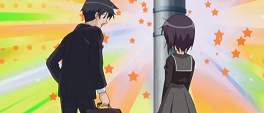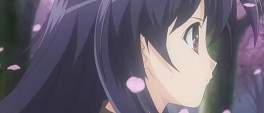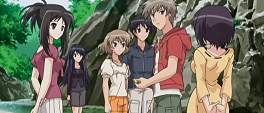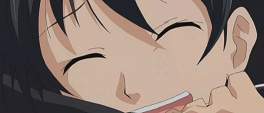How do you rearrange the old and tired "childhood friend" romantic comedy? Fundamentally, you can't, but setting it from the perspective of the returning childhood friend is a pleasant change. Unfortunately "Myself; Yourself" is still rigidly defined by the same romantic comedy template that has been recycled again and again, in the first three of a potential thirteen episodes it explores none of the obvious avenues of character development and somehow manages to shoehorn a swimsuit episode in...
Instead of examining the shock of coming back to the place you grew up and seeing how stark the differences of then and now are, "Myself; Yourself" barrages the viewer with an instantly familiar cast of characters: the busty ditz, the flat-chested tsunderreko, the affable best-friend, the obvious ice-cold love interest and the token diversion from said love interest. If it weren't a wholly standalone project, it would be effortless to peg the series as straight out of a dating sim or ero-game. The majority of the comedy and fan-service stems from the buxom pixie, voiced by the distinctive Tomoko Kaneda, it is at first odd to hear Azumanga's Chiyo in another character, but her boundless enthusiasm and plethora of almost inaudible noises make the character, what one can only assume is, the very epitome of "moe". In contrast, the terminally bland protagonist sports an everyman personality which only makes him all the more distasteful despite his apparently dark past.
The protagonist's reason for moving back to his hometown is contained within that past however it is portrayed without subtlety, the ending of each episode closes with an enigmatic phone-call from his mother which only serves to highlight, then underscore the series vapid attempts at holding interest. It's a worthwhile tactic if skilfully used, the promise of harbouring serial-killer tendencies would be enough to promote further viewing; however the series has done nothing but provide a flowery, rose tinted view of returning to one's birthplace. Sana Hidaka slots immediately back into his old circle of friends without any conversation as to what transpired in his missing five years from either party, instead there are some torturous character collisions, blatantly manufactured as Sana extols the importance of a song written by an old friend while said friend lurks, listening in the next room. It's trite, obvious and saps credibility from the story, tainting any further developments that may occur.
Studio Dogakobo, whose previous credits include the interminable Saikano, provide a generic and rapidly disintegrating art-style to the show: character art frequently distorts and most scenes are bookended with a statically blank stare from the protagonist. "Serviceable" would be the only adjective to describe the production, the exception to this is the energetic opening which kicks off the beat that the rest of the episode tries to keep up with. The ending is the polar opposite of this consisting of little more than a suggestive still frame, painstakingly panned; both are reminiscent of the Love Hina format, but without the constant visual (and mental) barrage, "Myself; Yourself" does little else other than enter with a bang then mill aimlessly around the debris.
To its credit, the series sporadically manages to elicit a smile although this is by far the exception to the rule; the majority of each episode is little more than straight-faced teenage drama without any form of innovation or hook. Despite all of this, "Myself; Yourself" is enjoyable to watch insofar that it is inoffensive in its delivery. There is nothing beneath the surface and the introductory episodes at least manage to stay on the brighter side of mediocrity; whether this averageness will be maintained beyond the forthcoming exposition highlighted by the obvious foreshadowing will be the test of the series; although anything except the most pitch-black of endings would be a sore disappointment.







